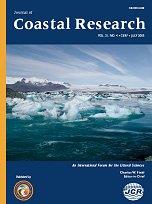The muddy Guyanas coastline in South America experiences significant short-term change involving alternations of accretion and erosion as a result of the influence of mud from the Amazon River. In French Guiana, the dynamic changes due to mud banks permanently migrating alongshore have a considerable impact on both coastal ecology and economic activities. As a result, monitoring of these mud banks constitutes an important coastal management issue. In this article, focus is placed on the development of a method for the monitoring mud bank migration rates since 1986 between the coastal cities of Cayenne and Kourou, spaced 60 km apart and using for the first time high temporal resolution satellite images rather than aerial photographs. To achieve this, 16 satellite pour l'observation de la terre (SPOT) images and one Landsat image covering the period 1986–2002 were acquired and integrated in a geographical information system (GIS). Because of tidal range variation on this mesotidal coast, mud bank characteristics cannot be objectively quantified using classical methods. Mathematical processing of the satellite imagery data, including correction for tides, was performed to obtain a set of coherent data for analysis of parts of the mud bank associated with intertidal mudflat development, from which quantification rates of mud bank migration becomes feasible.
Rates of long shore migration of the mud bank recorded up to 2002 are highly variable. The intertidal part of the bank has slowed down in the past years, resulting in a cross-shore extension of the bank. This slowdown occurred following a rate of migration much higher than those reported in the literature. Seasonal events are also recorded between 2001 and 2002. The variability in rates of migration deduced from the method reported in this study corroborates a pattern reported from earlier studies in Guyana, Surinam, and French Guiana based on more traditional methods, notably aerial photographs. This variability is tentatively attributed to changes in wind intensity and to local environmental parameters, such as coastline orientation, and the occurrence river estuary outflow and bedrock headlands.





